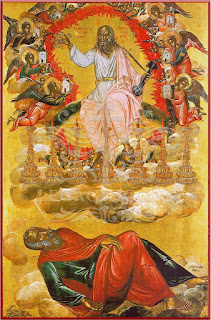St. John writes, "Then I saw a new heaven and a new earth, for the first heaven and the first earth had passed away…’ The "new heaven and a new earth" is understood as the culmination of God's redemptive work, where earthly life tainted by sin and death is transformed and renewed. This reflects God's original intent for creation, a perfect harmony of humanity and the cosmos with Him.
For Orthodox Christians salvation not merely individual redemption, but is a cosmic transformation and renewal. The "new heaven and a new earth" indicates not the annihilation of the current world, but its glorious transformation and restoration to its intended beauty and harmony. In the new creation, humanity is not only restored to its pre-Fall condition, but is elevated to participate in God's divine nature (2 Peter 1:4).
The Divine Liturgy is seen as a participation in the heavenly worship— a foretaste of the coming Kingdom. References from this vision of Saint John’s are found throughout the Liturgy, emphasizing the connection between earthly worship and the eternal counterpart in the new creation.
The Divine Liturgy is seen as a participation in the heavenly worship— a foretaste of the coming Kingdom. References from this vision of Saint John’s are found throughout the Liturgy, emphasizing the connection between earthly worship and the eternal counterpart in the new creation.
New Heavenly Jerusalem
Saint John further visualizes, “I saw the Holy City, the new Jerusalem, coming down out of heaven from God, prepared as a bride beautifully dressed for her husband.” The New Jerusalem represents a place of perfect communion between God and humanity, and a beacon of the Church's destined glory. The imagery and descriptions of the New Jerusalem align with the broader themes of theosis (deification), liturgical worship, and the hope of resurrection and eternal life.
A life in union with God
Saint John continues hearing a loud voice, “Look! God’s dwelling place is now among the people, and he will dwell with them. They will be his people, and God himself will be with them and be their God.” This reflects the intimate union that God desires with humanity—a theme found especially in the Eucharist where we partake of the real presence of Christ's Body and Blood. Our sacramental life in the Church is a foretaste of the eternal communion of God dwelling with His people that Saint John foresaw. The Orthodox Church lives in anticipation of the full realization of God's Kingdom.
St. Symeon the New Theologian also experienced and wrote about an intimate union with God and how it is achievable in this life and then more fully in the age to come. This journey, termed Theosis, is central to Orthodox spirituality. This process that leads one towards union with God requires God's grace. It is also based on a central Orthodox doctrine that distinguishes between God's essence and His energies. St. Gregory Palamas clarified this ancient teaching in the 14th century and has contributed significantly to understanding the nature of this union. It is because of the reality of His uncreated energies that we are able be united with Him. The saints, especially the Theotokos (Mother of God) and all the martyrs, already participate fully in this reality. Their intercessions and roles as exemplars point to the promise of found in Revelation where all of God's people will dwell with Him.
No more suffering
Saint John also says, “He will wipe every tear from their eyes. There will be no more death’ or mourning or crying or pain, for the old order of things has passed away.”This captures the hope that in the end, all sorrow, pain, and death will be abolished. This promise of hope is a central tenet of Orthodox faith.
Saint John’s mystical vision of the glorious world to come supports the Orthodox emphasis on salvation as a mystical union with God. This theme is echoed in our liturgical prayers and hymnology as well as the teaching of the Church Fathers.
It’s is important to remember that these visions that Saint John recorded in the Book of Revelation are about a realm that cannot be completely described in earthly terms. They are mystical. We must be humble and limit our speculation about them. The Church is our beacon and bridge to guide us from this world to the next through the sacramental life it offers, preparing us to be seen as worthy of entering into this Paradise.

